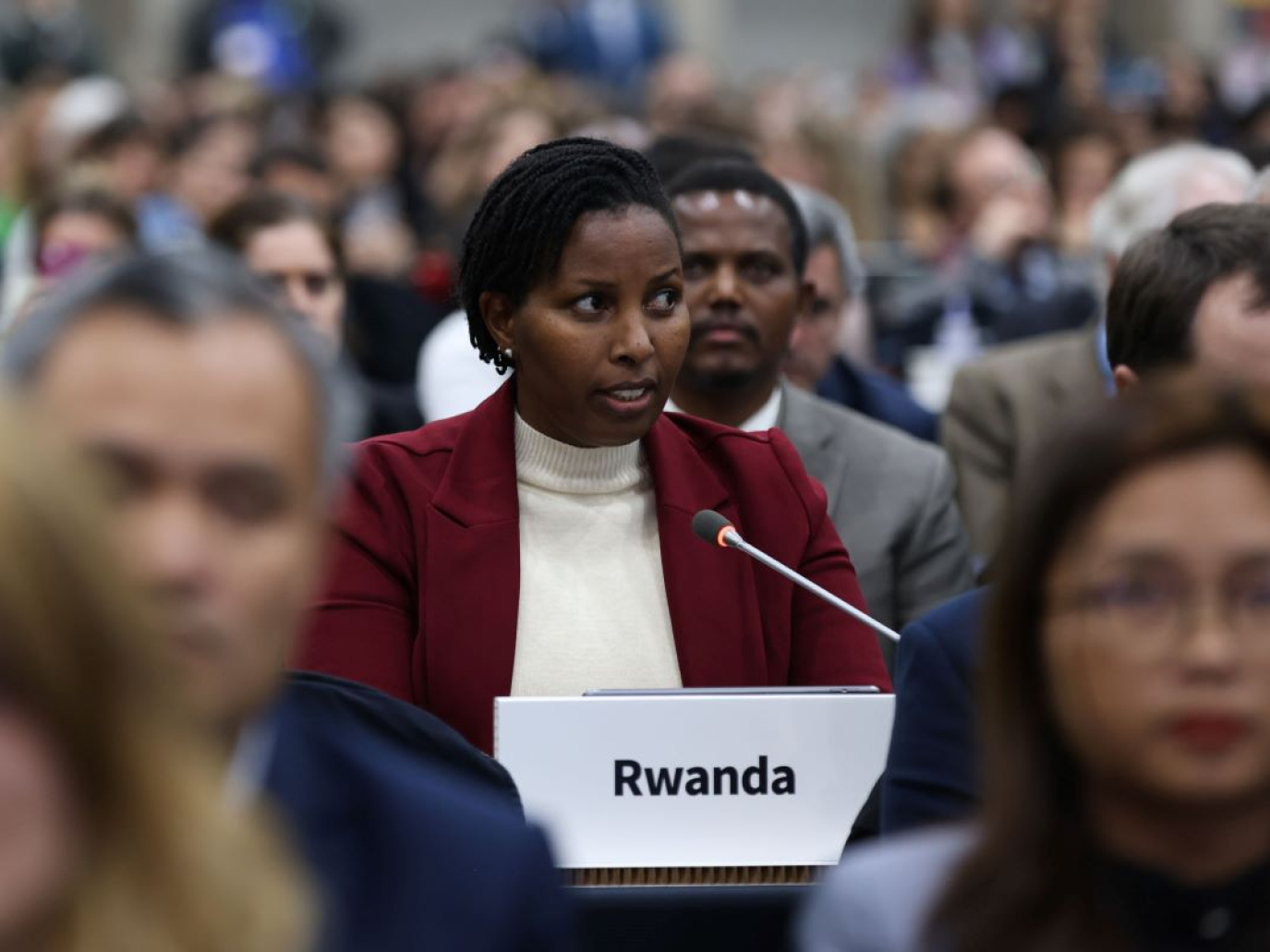This article is also available in Italian / Questo articolo è disponibile anche in italiano
At 2.50 a.m. of Monday, 2 December in Busan, South Korea, the fifth round of negotiations (INC-5) for an Internationally Legally Binding Instrument (ILBI) to combat plastic pollution ended without an agreement. The Intergovernmental Negotiating Committee decided to reconvene in an additional session in 2025, where negotiations will resume based on a non-paper produced by INC Chair Vayas Valdivieso.
According to the agenda, delegates were to work in four contact groups and come out with a substantive draft of the ILBI by Friday, 29 November. In this way, the Legally Drafting Group would have had time to review the draft agreement before negotiators adopted it by Sunday, 1 December. However, the work was slower than expected and negotiators failed to produce any text. Three were the areas of greatest disagreement: dangerous products and chemicals used in plastic products (draft Article 3 in Vayas Valdivieso’s third non-paper); supply (draft Article 6); and finance, including the establishment of a financial mechanism (draft Article 11).
Global plastics treaty, critical points
For drafts of Article 3 and Article 6, negotiators opinion ranged from the complete exclusion of the issue from the ILBI (position maintained by the Like-minded countries and the Arab Group), to proposals for listing the most harmful products and chemicals to be banned in plastic products, introducing a global target to reduce the supply of primary plastic polymers to sustainable levels and promoting the circular economy along the entire life cycle of plastics (position maintained by the High Ambition Coalition countries and other “willing countries”).
On draft of Article 11, shared opinions included the need for a dedicated and autonomous financial mechanism mainly funded by developed countries that would facilitate the implementation of the future treaty in developing countries. They also included a financial mechanism, funded by all parties and additional sources, including industry.
The INC failed to reach an agreement even on topics that seemed less divisive, such as waste management. During the plenary meeting on Wednesday 27 November, most negotiators expressed frustration with the delaying tactics used by the Like-minded countries group. “This is turning into a mini-COP on climate,” said one delegate, highlighting “similar delaying tactics” to the ones seen during the climate negotiations. This refers to the use of consensus decisions to block progress. On 25 November, at the opening of the meeting, India, the Russian Federation, Kazakhstan, Bahrain, Egypt, Saudi Arabia for the Arab Group, and Kuwait for the Like-minded countries, reiterated that all decisions on substantive issues were to be taken by consensus and that procedural rule 38.1 (which allows to vote if consensus is not found) should not be invoked.
Vayas Valdivieso's efforts and the closed-doors consultations
On Friday 29 November, in an attempt to break the stalemate in negotiations, Vayas Valdivieso interrupted the work of the contact groups and began informal consultations behind closed-doors. Based on opinions gathered from delegates from various countries, Vayas Valdivieso produced a new informal document (his fourth non-paper) that was circulated during the evening. According to observers, the decision of the INC President to produce a new draft of the text of the agreement was a courageous move and “potentially one of the most significant moments of the negotiation”. Indeed, during the plenary meeting Saudi Arabia said that the greatest risk is that of “seeing a text parachuted from above”.
Informal closed-door consultations continued on Saturday 30, when rumors began to circulate of an INC-5.2 or an extension of the current meeting until Tuesday, December 3. On the afternoon of Sunday, December 1, Vayas Valdivieso made public a fifth version of his informal document (Chair’s Text). In the final plenary on Sunday evening, delegates decided to adjourn the session to a next meeting in 2025, and at 1:13 a.m. on Monday, December 2, they accepted the new text of the INC President as a basis for negotiations.
“While INC-5 saw progress on the text, it failed to address the underlying political and procedural problems that have marred this process from the outset”, said to Renewable Matter Magnus Løvold of the Norwegian Academy of International Law. “I think more and more countries see that some of the countries involved, like Saudi Arabia and Russia, are negotiating in bad faith and will never agree to a treaty, to say nothing of an effective treaty. For INC-5.2 to be a success, the ambitious countries need to leave the spoilers behind and conclude a treaty without them. This is clearly the only way. The joint statements delivered in plenary by Rwanda and Mexico show that there’s a progressive majority that may be willing to do this.”
Rwanda, Mexico and Panama lead the way of the “willing countries”
In the plenary session on Sunday evening, Juliet Kabera, negotiator of Rwanda (co-chair country together with Norway of the High Ambition Coalition) spoke on behalf of 85 States and expressed “strong concerns about ongoing calls by a small minority group of countries to remove binding provisions from the text that are indispensable for the treaty to be effective”. At the end of her speech, she asked those in the room “to stand up” if they agreed with an ambitious treaty. Almost the entire room stood, a very clear sign of ambition. After her, Camila Zepeda from Mexico began her speech by reading the names of the 95 countries that endorsed a “legally-binding” provision to “phase out” the most harmful plastic products and dangerous chemicals used in their production.
In a press conference for member states held before the plenary assembly, developing countries and EU members gave a “heroic show of strength”. "This is not a drill, this is a fight for survival. Plastics are not convenient; they are a weapon of mass destruction”, said Juan Carlos Monterrey from Panama. “If we don’t get an ambitious treaty of Busan it will be a betrayal... history will not forgive us". According to the Center for International Environmental Law (CIEL), the EU also played a “crucial role”: Anthony Agotha (EU) and Olga Givernet (France) both issued statements in favor of ambitious measures.
“What we saw in Busan was a weaponization of consensus by a small number of countries to stall progress and undermine the negotiations”, said David Azoulay, Director of Environmental Health at CIEL. “We must resist the idea that this process is destined to remain paralyzed by obstruction. At the next session, countries must once and for all clarify that they are ready to use all options, including voting, to deliver the treaty they continue to affirm is needed.”
Many lobbyists at the Global Plastics Treaty negotiations
On the second day of negotiations, civil society representatives denounced the INC-5 organization for severely limiting participation in the negotiations. Despite nearly 1,900 INC participants, the work of the contact groups was held in rooms with only 60 seats allocated to non-member participants. This figure amounts to 3% of the registered participants. The situation was later resolved in the following days.
Again on Tuesday, 26 November, a CIEL analysis showed that 220 lobbyists from the chemical and fossil fuel industries were registered to participate in INC-5. Taken together, they would be the largest single country. By comparison the host country, the Republic of Korea, had 140 representatives, the delegations of the European Union and all its member states had 191, and the independent scientists of the Scientists’ Coalition for an Effective Plastics Treaty had 70.
“As independent scientists, we are concerned that science has been misused to create confusion and delays by some Member States.” said Trisia Farrelly, Professor and Honorary Fellow at Massey University and Senior Scientist at the Cawthron Institute (New Zealand) in a press release of the Scientists’ Coalition released after the end of INC-5. “This further emphasizes the importance of robust independent science and strategies to prevent conflicts of interest from derailing the future treaty”,
On Saturday 30, during a press conference of the International Indigenous Peoples’ Forum on Plastics, Indigenous representatives stressed: “We have been silenced and strategically undervalued” in these negotiations. “How can you talk about a just transition, when we are not given a space at the table?”.
Cover: Juliet Kabera, Photo by IISD/ENB - Kiara Worth



